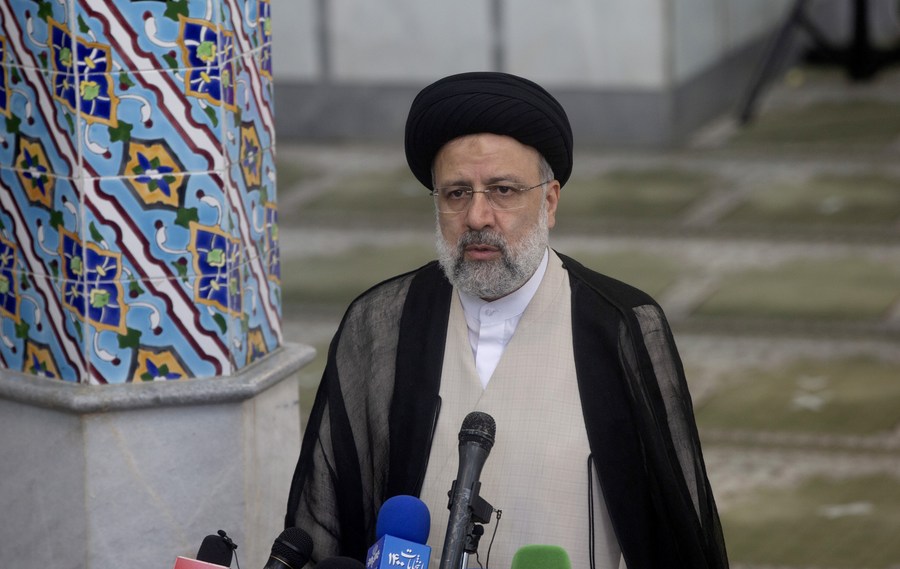Ebrahim Raisi wins presidential election in Iran
By JAN YUMUL in Hong Kong | China Daily Global | Updated: 2021-06-21 07:00

Country will continue to focus on peace and development policies, expert says
Ebrahim Raisi's victory in the Iranian presidential election on Saturday presents an opportunity for the country's economic recovery, experts said.
Raisi's rise to the presidency comes as negotiations with major powers to revive a nuclear deal enter a critical phase in Vienna, they said.
Asif Shuja, an Iran expert and senior research fellow at the Middle East Institute at the National University of Singapore, said that with Raisi as president, Iran is likely to continue its focus on development and peace policies.
Raisi, one of four final candidates, garnered almost 18 million votes out of some 28 million ballots, or more than 60 percent, though the turnout of 48.8 percent was affected by the pandemic, the Iranian Interior Ministry announced on Saturday. In 2019, he was named Iran's judiciary chief by Iranian Supreme Leader Ayatollah Ali Khamenei. Iranian President Hassan Rouhani and all three other candidates congratulated him.
"Starting Aug 4, Raisi will be the president of all of us, and everyone will fully support him and his legitimate government," Rouhani said in a joint news briefing with Raisi.
Russian President Vladimir Putin sent greetings to Raisi. The Russian leader also expressed hope that the relations between the two countries would keep progressing toward mutual constructive cooperation in different areas at bilateral and international levels.
The presidents of Armenia, Azerbaijan, Iraq and Syria, Pakistani Prime Minister Imran Khan and the leaders of Lebanon and Turkey, among others, have also extended their congratulations. During the election, Raisi promised enhanced cooperation with Iran's neighbors and friends.
After assuming office in August, Raisi is expected to get to work on a campaign promise to improve the economic condition of the people, crippled by the United States' sanctions and the COVID-19 assault. He has introduced himself as the rival to aristocracy, inefficiency and corruption while working for cooperation and interaction with the world.
The talks of Iran and six world powers on the return of the US to the 2015 Iran nuclear deal entered a new phase this week. In 2018, the United States ditched the pact under which Iran accepted curbs on its nuclear program in hopes of scrapping sanctions against it.
For Norafidah Ismail, a senior lecturer and Middle East expert at the School of International Studies at Universiti Utara Malaysia, no matter who becomes the Iranian president in the future, the country will continue with the 25-year strategic agreement signed between Iran and China in March, which is aimed at boosting ties and regional partnership.
Sujata Ashwarya, an associate professor at the Centre for West Asian Studies at Jamia Millia Islamia University in New Delhi, said the China-Iran agreement of 25 years can give Iran a stronger negotiating position in the nuclear talks.
"After all, a new nuclear agreement is not about putting Iran on a fast track to better political or diplomatic relations with the US and Europe. A prospective nuclear deal is unlikely to demand domestic political or social reforms, so the Islamic regime has little to fear," Ashwarya said.
Jawaid Iqbal, a political science professor and chairman of the Department of West Asian and North African Studies at Aligarh Muslim University in India said given "China's global outreach "and "the already strong relations between China and Iran", the election of Raisi "will only solidify this alliance".
Raisi's credentials against US sanctions, which target him, "will push Iran closer to China", which, unlike the US, "respects the internal sovereignty of each nation".
His election "is a signal of defiance against the West", Iqbal said. "It symbolizes the counterproductive effects of the USA's sanctions regime, which has resulted in the Iranian citizenry's disillusionment with a reformist position."
"Initially, the US will intensify its economic attacks against Iran's new presidential regime. However, it will be soon compelled to negotiate as Iran reaches uranium enrichment," he added.
























